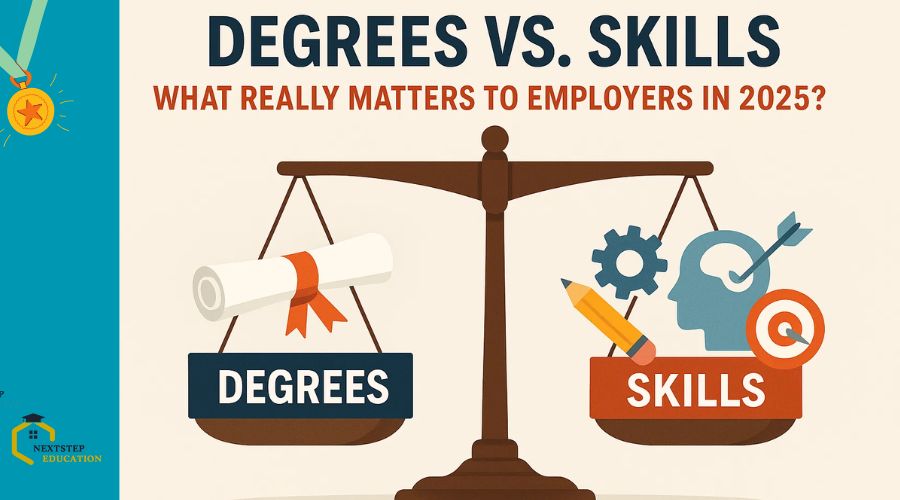Introduction: The Changing Landscape of Hiring in 2025-26
Not long ago, a college degree was considered the ultimate key to landing a good job. But times are changing. In 2025, companies like Google, Accenture, and IBM openly state that skills matter more than degrees. The global job market is shifting rapidly due to AI, automation, and digital transformation.
According to a LinkedIn Workforce Report (2024), 72% of employers now prioritize skills over formal education when making hiring decisions. From IT and data science to digital marketing and creative fields, employers want to see what you can do, not just what you studied.
In this blog, we’ll explore whether degrees or skills hold more value in today’s job market, look at examples from top companies, and share practical advice for students and professionals to stay employable in 2025-26.
Why This Debate Matters in 2025-26
The debate between degrees vs. skills isn’t new—but it’s more critical now than ever. As industries evolve, employers are redefining what makes a candidate “job-ready.”
1. The Skills Gap Crisis
A World Economic Forum (2024) report reveals that over 50% of employees will need reskilling by 2027 due to AI and automation. Companies are struggling to find candidates with the right technical, digital, and soft skills, even among degree-holders.
2. Big Companies Leading the Change
Global companies are already moving towards skills-first hiring:
-
Google and IBM have removed degree requirements for many roles, emphasizing certifications and demonstrable skills instead.
-
Accenture launched a “Skills to Succeed” program, hiring thousands of non-degree professionals.
3. India’s Job Market Perspective
In India, NASSCOM (2024) reports that 65% of IT hiring is now skills-based, particularly in AI, cloud computing, cybersecurity, and data analytics. Startups and SMEs are also preferring candidates with hands-on project experience over purely academic backgrounds.
Bottom Line: In 2025-26, having a degree alone is no longer enough—what you can do matters more than what’s written on paper.
Employers are increasingly focusing on Top In-Demand Skills for 2025 rather than just academic degrees.
The Case for Degrees – Why They Still Matter
While skills are becoming the main hiring criteria, degrees still hold significant value in 2025-26, especially in certain professions and industries.
1. Degrees Provide Foundational Knowledge
Professions like medicine, law, engineering, and research require a deep theoretical foundation that only structured degree programs can provide. For example:
-
A doctor cannot practice without an MBBS degree.
-
Engineers designing bridges need accredited qualifications for safety and compliance.
2. Credibility & Global Recognition
A degree acts as a trusted benchmark for employers worldwide. A Harvard MBA or IIT engineering degree signals not only knowledge but also rigorous selection and training.
3. Career Advancement in Corporate Roles
In many industries, degrees are mandatory for promotions into senior positions. For instance:
-
CFA for financial analysts
-
LLB for legal consultants
-
PhD for university professors
4. Networking & Opportunities
Top universities offer networks, mentorship, and placement assistance that self-learning often lacks. These connections can open doors to high-paying global opportunities.
Example: Sundar Pichai (CEO of Google) leveraged his IIT-Kharagpur degree + Stanford MBA to enter global leadership roles.
The Case for Skills – Why Employers Are Prioritizing Skills Over Degrees
In 2025-26, skills have become the real currency of employability. Employers are no longer asking, “Where did you study?” but rather, “What can you do?”
1. Faster Adoption of Technology
Industries like AI, data science, cybersecurity, and digital marketing evolve so rapidly that a four-year degree often lags behind industry needs.
Example: Google, IBM, and Accenture now hire certified coders and analysts without formal degrees.
2. Demonstrable Results Over Paper Credentials
Recruiters prefer portfolios, GitHub projects, real-world case studies, or freelance experience over transcripts.
Example: Many top UX/UI designers on platforms like Dribbble or Behance are self-taught yet work with Fortune 500 companies.
3. Cost & Time Efficiency
Learning skills through bootcamps, online certifications (Coursera, Udemy), or internships is faster, cheaper, and more adaptable than traditional education.
Example: A 6-month AWS Cloud Certification can lead to a $100k/year job, bypassing a 4-year IT degree.
4. Skills-Based Hiring Trend
LinkedIn’s 2025 Workplace Report reveals:
-
72% of employers now use skills-based assessments in hiring.
-
Companies like Tesla, Apple, and Netflix focus on skills-first hiring policies.
Certain skills lead to some of the Top 20 Highest Paying Jobs in India, especially in technology and finance sectors.
Striking the Right Balance – Degrees + Skills for Maximum Career Growth
While skills are essential, degrees still hold value in 2025-26, especially in fields where credentials are mandatory (medicine, law, chartered accountancy). The secret is combining both for long-term success.
1. When Degrees Still Matter
-
Regulated Professions: Doctors, Lawyers, and Architects require accredited degrees.
-
International Opportunities: Many countries mandate degrees for visa sponsorships.
-
Leadership Roles: MBAs and advanced degrees still help in executive positions.
2. How to Complement Your Degree with Skills
-
Upskill Continuously: Learn AI tools, data analytics, digital marketing, or soft skills like leadership & communication.
-
Build Real-World Experience: Internships, freelancing, and personal projects showcase your abilities beyond academics.
-
Leverage Online Credentials: Certifications from Google, AWS, Microsoft, HubSpot add weight to your CV.
3. Future-Proofing Your Career
Employers want adaptable professionals—those who can learn, unlearn, and relearn.
Example: A marketing graduate with AI-driven marketing tools expertise is far more competitive than one relying solely on a degree.
Real-World Examples & Employer Insights (H2)
Skills-First Hiring Is Gaining Momentum
-
A recent report by Forbes reveals that 90% of companies hiring based on skills over degrees report fewer hiring mistakes, while 94% say skills-based hires outperform those selected primarily for formal credentials. Forbes
-
Another Forbes study indicates that 65% of hiring managers will consider a candidate solely for their demonstrated skills—even without a degree. Forbes
British Retailer Leading the Charge
Neil Clifford, CEO of fashion brand Kurt Geiger, banned degree requirements across all roles—even finance and shop floor—and established a “no degree necessary” policy. He cited inclusivity and the drive to tap underutilized talent as motivations. The Times
This trend mirrors broader shifts, as corporate leaders seek flexibility and potential over paper credentials.
Reducing the “Degree Bias”
LinkedIn data indicates a 14.2% increase in UK job postings without degree requirements between 2021 and 2024. Nearly half of UK employers in a 2023 Hays survey believe degrees are no longer necessary. The Times
An additional LinkedIn report reveals that over 45% of U.S. job postings no longer list degrees as mandatory, and skills-first approaches could expand talent pools nearly 10× globally. LinkedIn
What Job Seekers Think
According to a Harris Poll, 87% of job seekers believe hiring should focus on skill rather than a degree, and 79% say skills matters more than institutions offering them, and would stay longer at workplaces that invest in training. PR Newswire
Industry’s Struggle to Find Skilled Talent
In India, 98% of business leaders say accelerating AI adoption is a priority. Yet, 60% of recruiters say they can’t find candidates with the right mix of AI and soft skills like communication and problem-solving. Business Standard
This points to an emerging disconnect between demand and available talent, pushing employers to reconsider degree-centric hiring.
If you want to leverage your skills globally, read our guide on How to Get a Job Abroad from India
Key Insights:
-
Companies value skills more than ever—real-world ability is seen as a more accurate predictor of performance than degrees.
-
Removing “degree gates” helps uncover hidden talent pools—diverse, non-traditional candidates who bring practical strengths.
-
Job seekers want fair access and longer-term commitment from employers that invest in their growth.
-
There’s a growing skill gap, especially in AI and soft skills, that education systems must address.
Action Steps for Students & Professionals (H2)
1. Focus on In-Demand Skills (Hard & Soft)
-
Hard Skills: AI/ML, Data Analytics, Cybersecurity, Cloud Computing, Digital Marketing, UX/UI Design.
-
Soft Skills: Communication, Problem-Solving, Leadership, Critical Thinking.
-
Proof: A LinkedIn 2025 report shows that soft skills are as important as technical skills, with 92% of recruiters rating them critical to success.
2. Earn Industry-Recognized Certifications
-
Platforms like Google Career Certificates, AWS Certifications, Microsoft Learn, Coursera, and Udemy offer globally respected credentials.
-
Example: Google’s Data Analytics Certificate is accepted by over 150 employers worldwide—even without a college degree.
3. Build a Strong Portfolio
-
Instead of just listing degrees, showcase real-world projects, GitHub repositories, design portfolios, or case studies.
-
Example: Candidates with a GitHub portfolio have a 60% higher callback rate for tech roles compared to those with resumes only (Indeed 2024).
4. Network Smartly
-
Leverage LinkedIn networking, professional groups, and events.
-
Join niche communities (e.g., AI India Forum, Product Management Meetups) to access hidden job opportunities.
5. Pursue Internships & Freelancing
-
Gain hands-on experience via platforms like Internshala, Upwork, or Toptal.
-
Many employers now prefer candidates with practical exposure over theoretical knowledge.
6. Stay Updated & Keep Learning
-
Subscribe to industry newsletters, podcasts, and webinars.
-
Follow trends like AI integration, remote work, and skills-based hiring policies to remain competitive.
7. Leverage AI Tools to Upskill
-
Tools like ChatGPT, GitHub Copilot, Grammarly, and Duolingo AI can accelerate learning and productivity.
-
Tip: Employers appreciate candidates who can integrate AI efficiently into workflows.
New learning technologies are revolutionizing education. Check out our article Is AI the New Teacher? to see how AI is shaping future skills.
Conclusion: Degrees vs. Skills – The Final Verdict (H2)
In 2025–26, the debate between degrees vs. skills is no longer about choosing one over the other—it’s about balance. A degree still holds value, especially in regulated professions like medicine, law, or engineering, but skills have become the real currency of employability. Employers are actively seeking candidates who can demonstrate practical expertise, adaptability, and continuous learning.
If you’re a student, don’t just aim for a degree—build a portfolio of skills alongside it. If you’re a working professional, keep upgrading your capabilities to stay relevant in an evolving job market.
FAQs on Degrees vs. Skills (2025–26) (H2)
Q1. Will degrees become irrelevant in the future?
No. Degrees still matter for credibility, especially in regulated professions. However, they are no longer the sole factor—skills now carry equal or greater weight in hiring decisions.
Q2. Which skills are most in demand in 2025–26?
AI & Machine Learning, Data Analytics, Cybersecurity, Cloud Computing, Digital Marketing, UX/UI Design, and soft skills like problem-solving and leadership.
Q3. How can freshers compete with experienced candidates?
Build a strong portfolio, earn industry certifications, take internships/freelance gigs, and network on platforms like LinkedIn to showcase real-world capabilities.
Q4. Are certifications better than degrees?
Not necessarily—they serve different purposes. Certifications show specific skill expertise, while degrees provide a foundational base and credibility. Together, they create a strong career profile.
Q5. How are companies hiring differently in 2025?
Many companies now use skills-based hiring platforms, AI-driven assessments, and practical task evaluations instead of relying solely on resumes with degrees.




